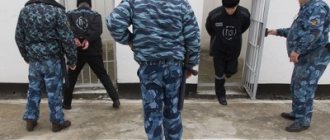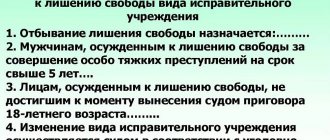Commentary to Art. 56 of the Criminal Code of the Russian Federation
The current criminal legislation knows two types of basic punishments, the content of which is imprisonment: imprisonment for a certain period and life imprisonment.
The content of the concept of “deprivation of liberty” is disclosed in Part 1 of Art. 56 of the Criminal Code of the Russian Federation, which states that deprivation of liberty consists of isolating a convicted person from society by sending him to a penal colony or placement in an educational colony, a medical correctional institution, a correctional colony of general, strict or special regime, or to prison.
Thus, deprivation of liberty consists of isolating the convicted person from society, which is ensured by special institutions that carry out the punishment of imprisonment. The difference between different types of institutions is determined primarily by the degree of isolation of the convict from society that is ensured in them. In this regard, we can talk about the regime of serving the sentence.
Imprisonment is the most severe criminal punishment (with the exception of the death penalty), since its serving is associated with the greatest amount of legal restrictions imposed on the convicted person.
First of all, this concerns the constitutional rights to freedom and personal integrity, to privacy, to the privacy of correspondence, telephone conversations, postal, telegraph and other messages, to the inviolability of home, freedom of movement, etc. As noted, the range of rights that are deprived of or limited by those sentenced to imprisonment is very wide, but is determined by the content of the punishment and the mode of serving it.
When considering the issue of imposing criminal punishment, the Plenum of the Supreme Court of the Russian Federation in Resolution No. 2 of January 11, 2007 “On the practice of imposing criminal punishment by the courts of the Russian Federation” draws attention to the need to comply with the requirements of the law on a strictly individual approach to imposing punishment, bearing in mind, that fair punishment contributes to solving the problems and achieving the goals specified in Art. Art. 2 and 43 of the Criminal Code of the Russian Federation.
In accordance with the general principles of sentencing (Article 60 of the Criminal Code of the Russian Federation), a more severe type of punishment from among those provided for the crime committed should be assigned only if a less severe type of punishment cannot ensure the achievement of the goals of punishment.
If the sanctions of the criminal law, along with deprivation of liberty, provide for other types of punishment, the court’s decision to impose imprisonment must be motivated in the sentence.
———————————
Bulletin of the Supreme Court of the Russian Federation. 2007. N 4.
In this regard, it can be said that punishment in the form of imprisonment, taking into account its severity, is the most undesirable, but necessary measure of state coercion. That is why it is represented in more than eighty percent of the sanctions in the articles of the Special Part of the Criminal Code of the Russian Federation.
The minimum term of imprisonment in accordance with the law is two months (including in cases where a sentence is imposed below the lower limit in accordance with Article 64 of the Criminal Code of the Russian Federation), and the maximum is twenty years.
An exception to this general rule is provided for minors. In accordance with Part 6 of Art. 88 of the Criminal Code of the Russian Federation, punishment in the form of imprisonment is imposed on convicted minors who committed crimes under the age of sixteen for a period of not more than six years. The same category of minors who have committed especially serious crimes, as well as other convicted minors, are sentenced to a term of not more than ten years. Punishment in the form of imprisonment cannot be imposed at all on a convicted minor who committed a crime of minor or moderate gravity for the first time at the age of sixteen, as well as on other juvenile convicts who committed crimes of minor gravity for the first time. A person who has committed one or more crimes, for none of which he was previously convicted, or when the previous sentence against him has not entered into legal force, should be considered to have committed a crime of minor or medium gravity for the first time.
In this regard, in practice, difficulties arise when assigning punishment in cases where, in accordance with Part 6 of Art. 88 of the Criminal Code of the Russian Federation, it is impossible to impose a sentence of imprisonment on a convicted minor, and the sanction of the article of the Special Part of the Criminal Code of the Russian Federation does not provide for another type of punishment (for example, the sanction of Part 2 of Article 112 of the Criminal Code of the Russian Federation “Intentional infliction of moderate harm to health” provides for only one punishment - imprisonment for up to five years). This problem is not regulated by law. Therefore, in practice, courts prescribe in such situations a punishment that is more lenient than that provided for this crime (Article 64 of the Criminal Code of the Russian Federation). In some cases, the provisions of Art. 73 of the Criminal Code of the Russian Federation - suspended sentence. But the latter practice should be recognized as clearly contrary to the law, since Part 6 of Art. 88 of the Criminal Code of the Russian Federation in the cases specified therein generally prohibits the imposition of punishment in the form of imprisonment.
In the case of full or partial addition of terms of imprisonment when imposing punishment for an aggregate of crimes, the maximum term of imprisonment cannot exceed twenty-five years, and for an aggregate of sentences - no more than thirty years.
For minors, the maximum sentence, including when imposed for a combination of crimes or sentences, cannot exceed ten years.
Imprisonment for a certain period can be applied as a replacement when pardoning those sentenced to life imprisonment (the term is not limited), as well as to the death penalty (Part 3 of Article 59 of the Criminal Code of the Russian Federation) for a period of twenty-five years. Imprisonment can also be applied to replace a more lenient punishment with a more severe one in the event of a person’s malicious evasion from serving a sentence (for example, replacing correctional labor with imprisonment - Part 4 of Article 50 of the Criminal Code of the Russian Federation, restriction of freedom - Part 4 of Article 53 of the Criminal Code RF).
Imprisonment for a certain period of time is served in correctional institutions, which include educational colonies, correctional colonies, prisons and medical correctional institutions (for patients with open tuberculosis, alcoholism or drug addiction). The functions of correctional institutions are also performed by treatment and preventive institutions (hospitals) in relation to sick convicts held there, as well as pre-trial detention centers in relation to convicts left to perform household maintenance work, and convicts sentenced for a term of not more than six months left in pre-trial detention centers with their consent.
Types of imprisonment
There are two types of drugs:
- imprisonment for a certain period of time;
- life imprisonment.
Imprisonment is one of the most common types of punishment. This type of punishment has a strong punitive effect and can lead to negative consequences resulting from the unreasonable application of this punishment against persons who have committed a criminal act of moderate or minor gravity. The court must carefully study and analyze each case in which a punishment in the form of drugs is imposed, and take a reasonable and balanced approach to resolving this issue.
Signs characterizing punishment in the form of imprisonment:
- the convicted person is forcibly isolated from society;
- the sentence is served in penitentiary institutions;
- The term of punishment is established in accordance with the Criminal Code (Article 56).
Judicial practice under Article 56 of the Criminal Code of the Russian Federation
Appeal ruling of the Judicial Collegium for Criminal Cases of the Supreme Court of the Russian Federation dated October 4, 2017 N 72-APU17-21
Based on the specific circumstances of the case and the gravity of the crimes he committed as part of an organized armed group (gang), including the murder of 11 cynical and ruthless persons, and if it is impossible due to the provisions of Part 4 of Art. of the Criminal Code of the Russian Federation sentencing him to life imprisonment, the court considered it fair to sentence him to the maximum term of imprisonment for the totality of crimes provided for in Art. of the Criminal Code of the Russian Federation, and assign him to serve part of his sentence in prison.
Cassation ruling of the Judicial Collegium for Criminal Cases of the Supreme Court of the Russian Federation dated June 27, 2018 N 44-UD18-16
By virtue of Part 1 of Art. The Criminal Code of the Russian Federation (as amended by Federal Law dated December 7, 2011 N 420-FZ) in such circumstances, punishment in the form of imprisonment is not imposed. Therefore, it must be mitigated. Also in accordance with Art. 7.27 of the Code of Administrative Offenses of the Russian Federation (as amended by Federal Law No. 326-FZ of June 3, 2016) theft of someone else’s property, the value of which does not exceed two thousand five hundred rubles, by theft in the absence of signs of a crime provided for in parts two, three and four of Article 158 of the Criminal Code of the Russian Federation applies to petty theft and entails administrative liability.
Appeal ruling of the Judicial Collegium for Criminal Cases of the Supreme Court of the Russian Federation dated July 10, 2018 N 34-APU18-5
Defining Bachinskaya E.V. term of punishment, the court proceeded from the upper limit of the sanction of Part 5 of Art. 228.1 of the Criminal Code of the Russian Federation, equal (taking into account the requirements of Part 1 of Art. of the Criminal Code of the Russian Federation) to 13 years and 4 months of imprisonment, and the lower limit established by Part 2 of Art. Criminal Code of the Russian Federation - 2 months of imprisonment.
Cassation ruling of the Judicial Collegium for Criminal Cases of the Supreme Court of the Russian Federation dated July 24, 2018 N 81-O18-1
The most serious crime for which, according to the verdict, Lukyanchikov A.A. was convicted, is the crime provided for in paragraph “h” of Part 2 of Art. 105 of the Criminal Code of the Russian Federation, for the commission of which the maximum calculable punishment is provided in the form of imprisonment for a term of 20 years. Half of this term is 10 years in prison. Thus, for committing murder and robbery, Lukyanchikov A.A. a sentence of imprisonment could have been imposed, taking into account the restrictions provided for in Part 4 of Art. of the Criminal Code of the Russian Federation, for a term of 25 years, and not 17 years 6 months, as the convicted person indicates in his complaint.
Appeal ruling of the Judicial Collegium for Criminal Cases of the Supreme Court of the Russian Federation dated 08/09/2018 N 78-APU18-16
By virtue of Part 4 of Art. According to the Criminal Code of the Russian Federation, for a combination of crimes, the guilty person may be sentenced to imprisonment for a term of up to 25 years. Taking into account the totality of circumstances mitigating the punishment of A.G. Agavelov, the court ruled out the possibility of sentencing him to life imprisonment. In addition, he assigned him terms of imprisonment, both for each crime individually and for their totality, which are not maximum by law.
Appeal ruling of the Judicial Collegium for Criminal Cases of the Supreme Court of the Russian Federation dated August 28, 2018 N 78-APU18-15
Thus, sanctions part 1 and part 2 of Art. 209, part 4 art. 162 of the Criminal Code of the Russian Federation provides for punishment in the form of imprisonment for a term of up to 15 years, and by virtue of Part 4 of Art. According to the Criminal Code of the Russian Federation, for a combination of crimes, the guilty person may be sentenced to imprisonment for a term of up to 25 years.
Appeal ruling of the Judicial Collegium for Criminal Cases of the Supreme Court of the Russian Federation dated October 2, 2018 N 14-APU18-15
At the same time, the court did not take into account the requirements of Art. 53.1 and part 1 of Art. Criminal Code of the Russian Federation when assigning punishment. Within the meaning of Art. 53.1 of the Criminal Code of the Russian Federation, punishment in the form of forced labor is imposed only as an alternative to imprisonment, that is, this type of punishment can be assigned to a convicted person only on the condition that he can also be sentenced to imprisonment.
Appeal ruling of the Judicial Collegium for Criminal Cases of the Supreme Court of the Russian Federation dated October 17, 2018 N 78-APU18-21
Sanction part 2 art. 105 of the Criminal Code of the Russian Federation provides for punishment in the form of imprisonment for a term of 8 to 20 years or life imprisonment. And by virtue of Part 4 of Art. According to the Criminal Code of the Russian Federation, for a combination of crimes, the guilty person may be sentenced to imprisonment for a term of up to 25 years.
Determination of the Judicial Collegium for Criminal Cases of the Supreme Court of the Russian Federation dated October 31, 2018 N 19-UD18-25
In accordance with Part 1 of Art. According to the Criminal Code of the Russian Federation, punishment in the form of imprisonment can be imposed on a convicted person who has committed a crime of minor gravity for the first time, only in the presence of aggravating circumstances provided for in Art. of the Criminal Code of the Russian Federation, with the exception of crimes provided for in Part 1 of Art. 228, part 1 art. 231 and Art. 233 of the Criminal Code of the Russian Federation, or only if the relevant article of the Special Part of the Criminal Code of the Russian Federation provides for deprivation of liberty as the only type of punishment.
Appeal ruling of the Judicial Collegium for Criminal Cases of the Supreme Court of the Russian Federation dated October 24, 2018 N 57-APU18-10
By virtue of Part 4 of Art. According to the Criminal Code of the Russian Federation, for a combination of crimes, the guilty person may be sentenced to imprisonment for a term of up to 25 years. Taking into account the totality of circumstances mitigating the punishment of Onopa A.Yu., the court ruled out the need to sentence him to life imprisonment. In addition, he did not assign him part 4 of Art. 162 of the Criminal Code of the Russian Federation additional punishment in the form of a fine and imposed terms of imprisonment, both for each crime individually and for their totality, which are not maximum by law.
Determination of the Judicial Collegium for Criminal Cases of the Supreme Court of the Russian Federation dated November 20, 2018 N 72-UD18-14
In the cassation appeal, the convicted person asks to change the category of the crime, to reduce the imposed punishment, citing the fact that, by virtue of Part 1 of Art. Of the Criminal Code of the Russian Federation he could not have been sentenced to imprisonment under Part 1 of Art. 109 of the Criminal Code of the Russian Federation, punishment under Part 1 of Art. 118 of the Criminal Code of the Russian Federation is subject to exclusion from the verdict, since the court, contrary to Art. The Criminal Code of the Russian Federation did not indicate the amount of deductions from the wages of the convicted person under Part 1 of Art. 222 of the Criminal Code of the Russian Federation imposed the maximum punishment, while the state prosecutor excluded the storage and acquisition of explosives from the scope of the charge and supported the charge only for their transportation. In addition, he believes that when assigning punishment, his admission of guilt for all crimes was not taken into account.






